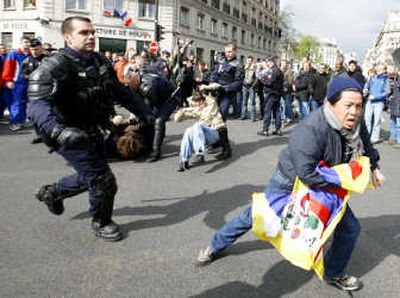Torch’s tortured trip tarnishes China’s plans

Laying down an ambitious route around the globe, China planned the torch relay for the 2008 Olympics to go well beyond the event’s normal role as an inoffensive, symbolic reminder that the next games were fast approaching.
This year, the record-breaking global circuit was intended to be an audacious preview of an Olympic Games that Beijing has designed to show off the best a rising China can offer.
But after two days of raucous protests in London and Paris, during which officials had to extinguish the flame five times Monday to protect it, the latest relay risks devolving into a defiant, four-month slog that could put China into daily public-relations combat with its critics.
A decision to halt the relay through Paris on Monday clearly embarrassed Olympic and Chinese officials. And they were taking steps to head off another firestorm when the torch makes its lone North American stop Wednesday in San Francisco.
U.S. Olympic Committee Chairman Peter Ueberroth will leave Olympic meetings in Beijing earlier than planned so he can help San Francisco officials cope with expected demonstrations there.
The Beijing Olympics long had been expected to spark protests because of what many feel are China’s abuses of human rights both domestically, especially in Tibet, and in its trade relationship with Sudan, which critics say has contributed to genocide in Sudan’s Darfur region.
Tibet has been a particular focus since demonstrations began March 10 in the regional capital, Lhasa, and spread to other places in western China, leading to violent clashes with government forces. The official death toll in Lhasa alone was 22, a figure that Tibetan activists said was a fraction of the actual toll.
The Olympic torch became a target of anti-China protests at the March 24 lighting ceremony in Ancient Olympia, Greece, and the growing intensity of the demonstrations in London and Paris has made for an unprecedented spectacle as the torch relay heads toward the Aug. 8 opening ceremony in Beijing.
The depth of expressed anger toward China may lead more heads of state to consider boycotting the opening ceremony, as German Chancellor Angela Merkel has said she will do and French President Nicolas Sarkozy has suggested.
While there has been some talk of having athletes boycott the Beijing Games, there seems to be almost no support among any national or Olympic leaders for such an action.
But Olympic officials clearly have been taken aback by seeing the torch turn into a symbol of animosity toward China, which had billed the relay as the “Journey of Harmony.”
“The Olympic flame belongs to the world, and these actions are a serious violation of the Olympic spirit,” Beijing Olympic officials said in a Monday press release on their official Web site. “They are bound to fail and will surely arouse the resentment of peace-loving people who support the Olympic Games.”
On Sunday in London, demonstrators tried both to grab the torch from one of the runners and to put the flame out with fire extinguishers, leading officials to make last-minute changes in the route. Some torch bearers were jeered for participating in the relay.
Officials canceled Monday’s final leg of the relay in Paris after they purposely extinguished the torch and put it on a bus five times rather than risk having it snatched by angry crowds. Protesters threw water at the torch, chained themselves to railings and hung banners on the Eiffel Tower and Notre Dame Cathedral that showed the Olympic rings as handcuffs.
“We respect the rights of those who wish to gather and peacefully express a point of view, just as we expect the rights of those who are participating in the torch relay to also be respected,” USOC spokesman Darryl Seibel said Monday.
The very design that was intended to make China’s Olympic torch relay go down in history now makes it especially vulnerable to protests: It is longer, more international and more ambitious than anything before.
The route is a record-breaker, with 21,880 relay runners spanning six continents, and a controversial stop on the peak of Mount Everest.
Beijing Olympic authorities gave no hint that they will change the route, which is expected to draw further protests during stops in India and Australia. The Chinese undoubtedly will be relieved when it enters what are called “Chinese provinces” May 4.